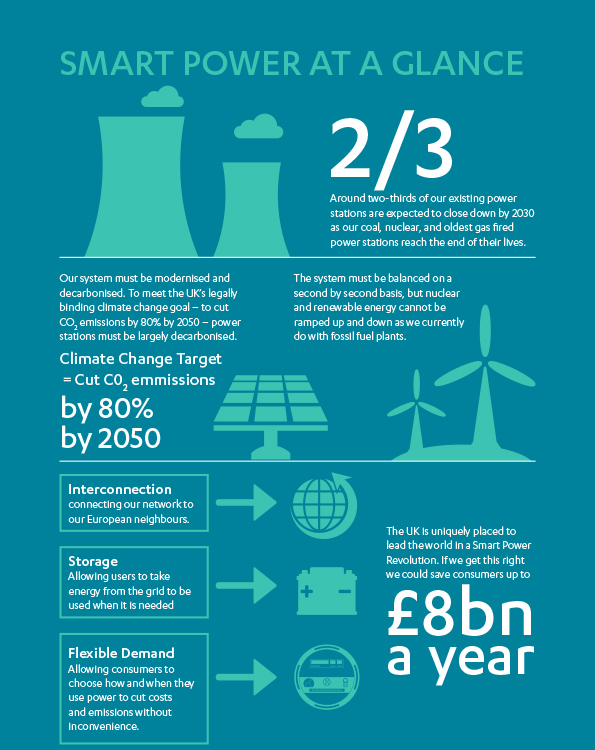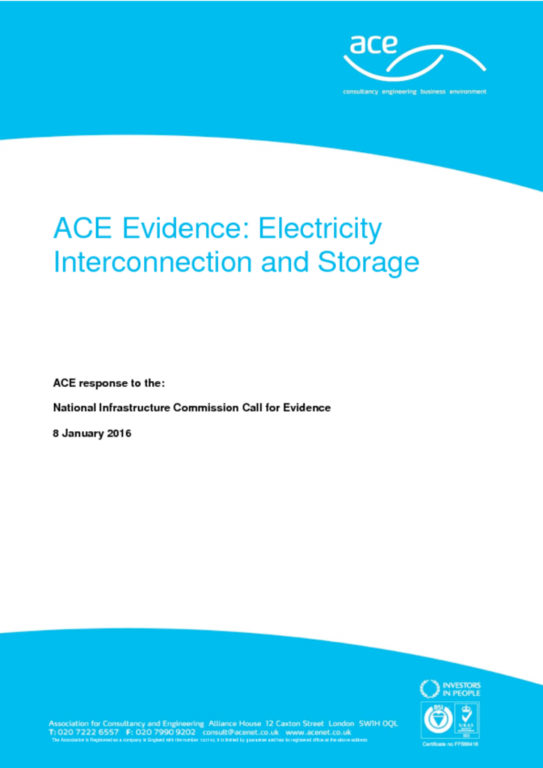Smart Power
A report examining how the UK can balance supply and demand within the electricity market.
Summary
In October 2015, the National Infrastructure Commission was asked to consider how the UK can better balance electricity supply and demand, aiming towards an electricity market where prices are reflective of costs to the overall system.
The Commission’s final report, Smart Power, concludes that innovations, interconnection, storage, and demand flexibility could together save consumers up to £8 billion a year by 2030, help the UK meet its 2050 carbon targets, and secure the UK’s energy supply for generations.
The report makes practical recommendations to this end – not new subsidies or substantial public spending – but towards the creation of a level playing field and a better managed network:
- government should pursue additional interconnectors with other European countries where the benefits are most significant
- the UK should become a world leader in electricity storage systems. Two steps are required: a review of the regulatory and legal status of storage, removing outdated barriers to be completed by Spring 2017 and implemented as soon as possible, and Ofgem should encourage network owners to use storage
- the UK should make full use of demand flexibility by improving regulation, informing the public of its benefits and piloting business models.
At Budget 2016 the government accepted the report in full.
Recommendations
The report made six recommendations for creating a more efficient electricity system, all of which were accepted in full by the government at the Budget in March 2016.
Government should pursue additional interconnectors with other European countries where the benefits are most significant
Interconnection investment decisions should continue to sit primarily with the private sector, but there is a role for government-led diplomacy to unlock those markets that can offer potentially large benefits to UK consumers. The government should therefore focus its efforts on exploring increased interconnection to markets with abundant sources of flexible low carbon electricity, such as Norway and Iceland.
The UK should become a world leader in electricity storage systems
Two steps are required:
- DECC and Ofgem should review the regulatory and legal status of storage and remove outdated barriers to enable storage to compete fairly with generation across the various interlinked electricity markets. The reforms should be proposed by Spring 2017 and implemented as soon as possible thereafter
- Network owners should be incentivised by Ofgem to use storage (and other sources of flexibility) to improve the capacity and resilience of their networks as part of a more actively managed system.
The UK should make full use of demand flexibility
The UK should make full use of demand flexibility by improving regulation, informing the public of its benefits it can provide and piloting business models:
- Ofgem should start an immediate review of the regulations and commercial arrangements surrounding demand flexibility with a focus on making participation easier and clarifying the role of aggregators; this should be complete by Spring 2017
- DECC should make future changes to the capacity market to reduce the costs and barriers to entry for demand flexibility
- DECC, Ofgem and National Grid should ensure that large users and opinion formers are aware of the money saving opportunities that demand flexibility can offer and encourage more industrial and commercial consumers to take part.
- pilots focusing on business models which make demand flexibility easy and attractive to consumers should be established and fully evaluated. Government should demonstrate best practice by investigating the scope for demand flexibility on its estate.
The System Operator must create new markets
The System Operator must create new markets that will allow open competition for the services it procures and ensure it keeps pace with the network it oversees.
The creation of an entirely independent System Operator should not be treated as an immediate priority but should be kept under review in light of progress towards strengthening National Grid’s independence.
Ofgem should consider how it encourages the System Operator to develop new markets to provide ancillary services which allow new technologies to participate more easily. The long term goal must be for a more strategic and transparent approach to the procurement of ancillary services and more cost-reflective charging.
Enabling the transition to more actively managed local networks should be a government priority
Enabling the transition to more actively managed local networks should be a government priority. By Spring 2017 DECC and Ofgem should consult and set out how and under what timeframe this transition should best take place.
Ofgem should continue its work in encouraging network companies to make long term strategic decisions
Where upgrades to our networks are needed Ofgem should continue its work in encouraging network companies to make long term strategic decisions. Whilst this does increase the risk of stranded assets, the Commission believes that if there is a potential net gain to future consumers then this approach may be justified. If network owners are not best placed to manage this risk, they should work with third parties to help facilitate these investments.
Terms of Reference
The terms of reference for this study were published by the government in October 2015. They were as follows:
Delivering future-proof energy infrastructure
Consider how the UK can better balance supply and demand, aiming towards an energy market where prices are reflective of costs to the overall system. The aim should be to reduce the cost of providing secure, clean energy supplies whilst reducing the long-term need for investing in a surplus of back-up power stations and unnecessary network reinforcements.
This should pay particular attention to the roles of storage and interconnection, but may also consider related solutions such as demand side response.
The review will propose solutions to each of the following issues:
Whether the correct framework is in place to ensure that the UK’s electricity grid is operated in a way which fully considers the range of options for balancing supply and demand. If not, the review will propose what changes need to be made to the current framework, in particular whether there are grounds for increasing the independence of the system operator.
What barriers there are to the deployment of national energy storage capacity, considering both current and future technologies. This will consider what price signals and financial arrangements would enable low cost storage solutions to be delivered by the UK market where this reduces overall costs to consumers.
Assess what further electricity interconnection is likely to be in consumers interests, considering whether there are systematic barriers that could prevent cost-effective interconnection being realised. In particular:
- the ability of increased interconnection to reduce energy costs, lowering bills for consumers at a system-wide level
- the contribution of increased interconnection on security of supply, and how this compares to counterfactual scenarios
- the overall economic impact on the UK of a greater degree of interconnection.
Building on the above, note any project-specific barriers to the future delivery of more complex, high priority interconnection projects, and suggest how these may be mitigated.
Each of these options should consider the cost-reduction potential for the UK through to 2030 and 2050.
The conclusion of the review will be to provide advice to government on what next steps should be taken in respect of storage and interconnection investments, and whether an appropriate institutional framework is in place.
Where possible, the Commission should aim to develop market solutions to these issues.
The Commission should report back to government with recommendations on next steps by Budget 2016.
Supporting Evidence
The study was supported by an open call for evidence and two expert reports:
- Responses to our call for evidence
- A report from Poyry on the Costs and benefits of GB Interconnection
- A paper looking at Delivering future proof energy infrastructure.
Smart Power
Smart Power makes recommendations to ensure our electricity system is fit for the future.

Latest Updates

Coming up in 2024
This page shows a calendar reflecting the latest expected dates for Commission reports, publications and events. You can also sign up to receive our quarterly newsletter by entering your email address in the box at the foot of each website page.

Costs and benefits of GB interconnection
Research by Poyry forming part of the supporting evidence for the Smart Power report.

Delivering future-proof energy infrastructure
External research by UCL and the University of Cambridge's Energy Policy Research Group on the challenges and opportunities for delivering future-proof energy infrastructure, informing the Smart Power report.

